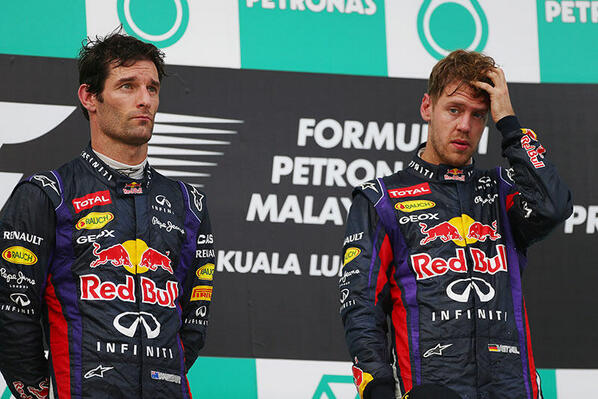 So the 2013 F1 season looks like being a belter already. If the team-mates infighting controversy is anything to go by, the F1 Show is going to entertain us again this year. In 2012 we had seven different winners in the first seven races, which made a very welcome change to the one team dominance that had often preceded last year. This year we have two different winners – and one of them shouldn’t have won at all!
So the 2013 F1 season looks like being a belter already. If the team-mates infighting controversy is anything to go by, the F1 Show is going to entertain us again this year. In 2012 we had seven different winners in the first seven races, which made a very welcome change to the one team dominance that had often preceded last year. This year we have two different winners – and one of them shouldn’t have won at all!
With the season’s second race coming just one week after the champs opener in Melbourne, the teams don’t have much chance to develop the cars to overcome any issues from race one, but the change of climate between Melbourne and Malaysia and the very different tracks meant that a number of teams saw their cars perform differently between the two races. In the end, whilst Red Bull scored a one-two and Mercedes a three-four finish, it wasn’t the cars we were all talking about after the chequered flag – it was the drivers’ behaviour in relation to team orders.
The very phrase “team orders” conjures up strong feelings amongst F1 fans. There are a number of historical examples of teams ordering their drivers to let team-mates pass or to not overtake the other team car, but it was Ferrari’s actions in the 2010 German Grand Prix that caused a massive upset amongst fans. The FIA had banned team orders after the 2002 season but in 2010 we saw Webber being asked to slow down for Vettel (which he refused to do and the two cars collided) and then we saw Felipe Massa being told “Fernando is faster than you… Can you confirm you understand that message?” before he slowed and allowed Alonso through. At the time Ferrari were fined for breaching the rules but by the end of the season the FIA gave in and dropped the rule completely.
Teams earn a lot of money from winning the F1 Championship, so they will do everything possible to maximise their chances to win. Towards the end of the season, it is very understandable when teams ask their less successful driver to help their team-mate to score maximum possible points to aid their chance of winning the championship. For teams orders to be an issue at the second race of the year is very rare.
Some drivers have clauses written into their contracts with the team that guarantee them preferential treatment. The very best drivers negotiate terms that include first choice of pit stop window and use of the only car if one of the team’s cars is damaged and unavailable. The team’s second driver will have agreed terms in their own contract that accept this second billing. If we think about what happened at the Malaysian Grand Prix, then we now know that Red Bull told Mark Webber that he should turn his engine output down (to save the engine wear and tear) and coast to the chequered flag and a race win. The team and drivers had agreed in advance that their concerns over tyre wear meant that they would not attack each other if possible towards the end of the race. They then told Vettel not to overtake Webber, as they wanted a safe one-two finish. As we all know, Vettel argued with Christian Horner and then ignored the order and past Webber to take the win. Meanwhile Mercedes had Hamilton in third and Rosberg in fourth. When Rosberg radio’d through to tell the team that he felt that he was a lot faster than Hamilton, effectively asking for permission to pass his team-mate, Ross Braun told him to hold position. Rosberg did challenge the request via radio but then settled in behind Hamilton and they finished in the same positions.
If you are a keen F1 fan, you will know that the cameras follow the top three drivers into a room immediately after the race where they grab a drink of water, put on their sponsored watches and caps etc before heading out on to the podium. In recent years, the F1 feed has included the audio feed from this coverage but it hasn’t been very interesting. Usually the top three just congratulate each other and maybe discuss key moments in the race. After the 2013 Malaysian Grand Prix, this coverage was a lot more interesting than normal. Hamilton looked thoroughly fed up, as he knew that Rosberg could and should have been given a chance to attack the Red Bull cars on track, but Webber looked really angry. When Vettel tried to talk to him, Webber made it very obvious that he felt aggrieved. Vettel stood there looking like a naughty schoolboy who know he was in trouble.
Vettel has since apologised but conspiracy theorists think that the whole incident shows that Vettel is in charge at Red Bull and that the team put him above all else. Some observers have commented that F1 teams want drivers who want to win at all costs. Whether that is the case or not, at least we are guaranteed that the season should be as interesting as ever.
Round 3 is in China on the weekend of 12-14th April – and the three week gap should mean that the teams will have developed their 2013 cars to overcome any issues from the first two races.
Jim Graham
Team Daytona

